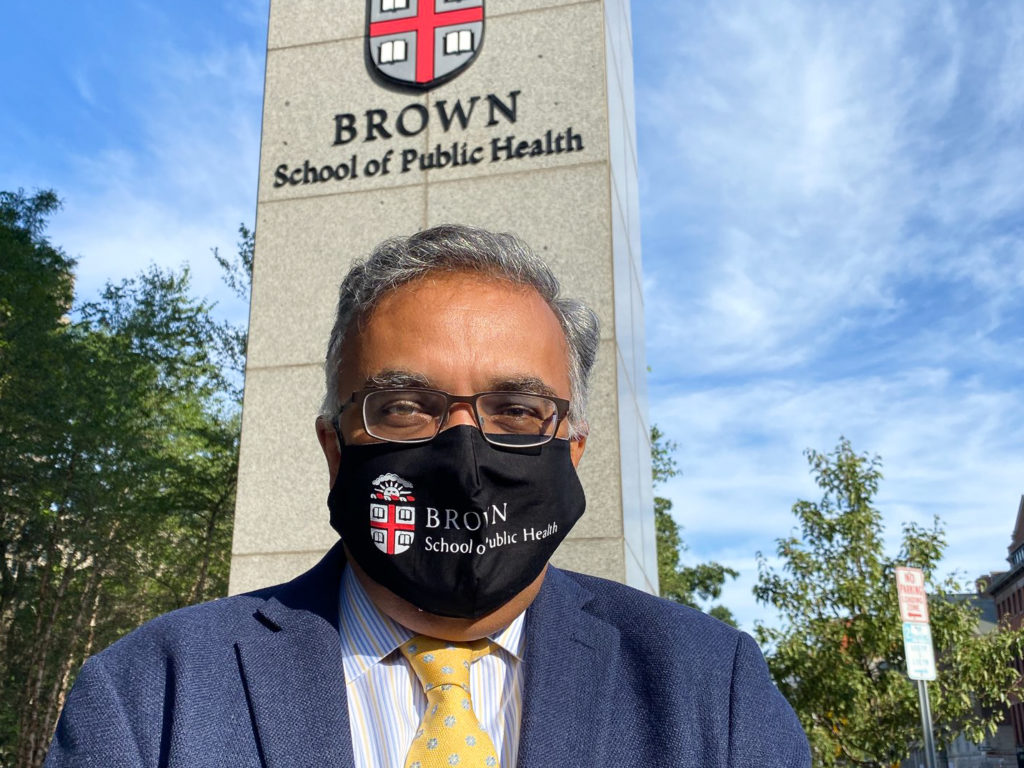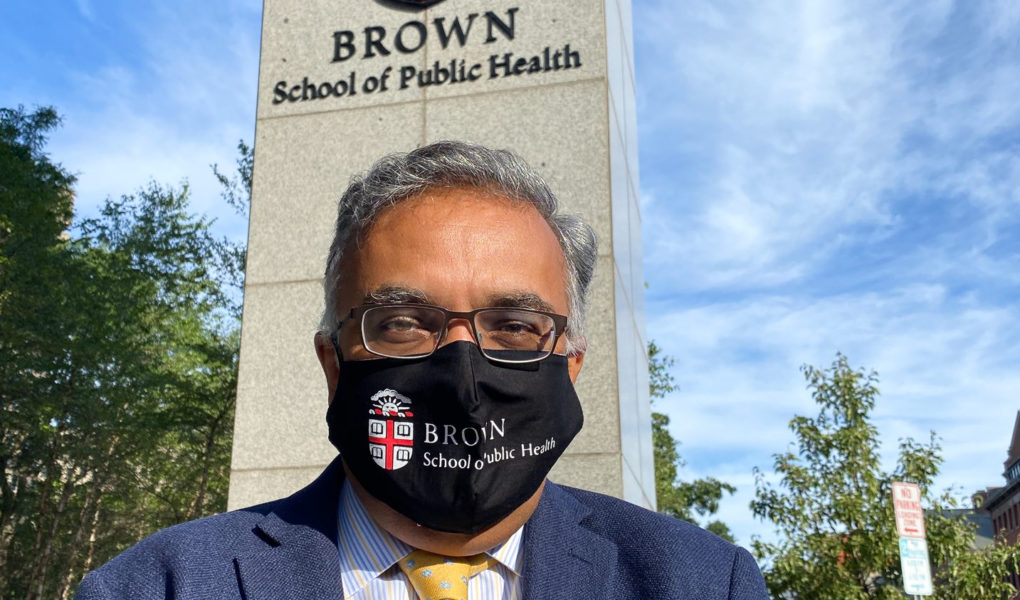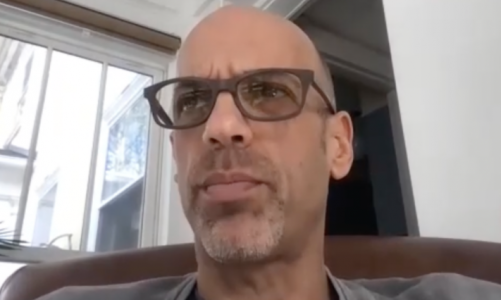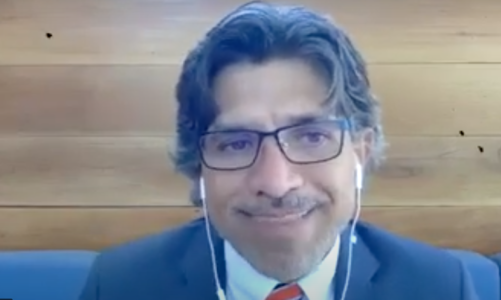
Ashish K. Jha, M.D., MPH, is the dean of Brown University’s School of Public Health. Before arriving at Brown last September, he served as Faculty Director of the Harvard Global Health Institute and Dean for Global Strategy at the Harvard T.H. Chan School of Public Health. An expert on pandemic preparedness and health policy research, Dean Jha led pioneering research on the Ebola outbreak in West Africa in 2014. In recent weeks, Dean Jha has been featured on CNN, MSNBC, and Fox News, among other news outlets, as a prominent voice providing insight into the global COVID-19 response. He has also published in the popular press, such as The New York Times and The Washington Post, as well as in prestigious academic journals like the New England Journal of Medicine. Dean Jha is a graduate of Columbia University and Harvard Medical School; he completed his Master’s of Public Health at the Harvard T.H. Chan School of Public Health and was elected to the National Academy of Medicine in 2013.
*This article was originally published in the Brown Political Review.
Sam Kolitch: You have proposed that we prioritize the vaccination of Americans over the age of fifty-five, instead of sixty-five, once healthcare workers and residents of long-term care facilities are vaccinated. Why?
Ashish K. Jha: This pandemic has disproportionately impacted poor people and minorities, particularly African Americans, Latinos, and Native Americans. So when it comes to vaccines, many public health professionals have thought about ways to avoid what initially happened with COVID-19 testing—where tests were made more available to wealthier white people than to other demographics. Right now, there are a lot of very complicated vaccination schemes that officials have been developing in order to create equity. While these complex schemes can be well intentioned and well designed, they are being implemented into a society that is inequitable at its core. So what I and others have called for is a simpler system that lowers the age cutoff to fifty-five, which is an easily enforceable approach. If you look at death by age and race, for instance, more than ninety percent of all African Americans who have died in this pandemic are over fifty-five. So, lowering the age to fifty-five will not only save as many lives as possible but it will also guarantee that people of color are not left behind. This will produce much greater equity than keeping the age cutoff at sixty-five or seventy-five.
SK: Are you confident that the existing vaccines will effectively immunize people against the variants from the United Kingdom, Brazil, and South Africa?
AKJ: I am not worried about the vaccines becoming ineffective against the variant from the United Kingdom. While there is less scientific clarity on the vaccines’ effectiveness against the variants from South Africa and Brazil, all the evidence I’ve seen suggests that the vaccines will be effective against these as well. There is a larger point worth mentioning with regard to variants, though. Larger outbreaks will inevitably bring about more variants, which increases the likelihood that we’ll need to build more vaccines for specific variants. While we can build new vaccines that would be effective against variants, we would have to re-vaccinate people who had already been vaccinated—which is such a pain from a public health perspective. So we need to do the best that we can right now to mitigate the spread.
SK: Is President Biden’s goal to vaccinate 100 million Americans in his first 100 days in office not sufficiently ambitious, given that we are already vaccinating more than one million Americans per day?
AKJ: I am sure that the Biden administration, internally, is thinking, “We want to vaccinate two million Americans a day.” The question is whether we, the public, would be better off by the administration overpromising and underdelivering or underpromising and overdelivering. The Trump administration overpromised and underdelivered throughout the entire pandemic. So if the Biden team is saying to themselves, “We may be able to get to two million vaccinations a day, but we don’t want to continue the pattern of overpromising and underdelivering,” I would sympathize with them.
SK: At the outset of the pandemic, prominent public health officials denounced the effectiveness of masks in order to preserve high-quality masks for healthcare workers. Similarly, some public health experts have recently underplayed the efficacy of vaccines, citing concerns that vaccinated people who begin to ignore public health guidelines would encourage unvaccinated people to do the same. Is misleading the public, even for its own benefit, a public health tactic you support?
AKJ: I think that it is never good to mislead the public for its own good. Doing so breeds mistrust. And once you’ve created mistrust amongst the public, public health officials have nothing to work with. On the issue of masks, I’ve gone back and done a lot of thinking about what I was saying in March of 2020. There were several times I said that I did not think masks were important. But I didn’t say this because I was worried that people would buy them and prevent hospitals from getting them. Perhaps there were some people who thought that way, but I honestly did not know in the beginning of March whether masks were going to be important based on the data. And I generally don’t tend to recommend things unless I feel I have a pretty good reason to recommend them.
At this point in time, I am very frustrated with some of the underselling of the vaccines’ effectiveness. I think some public health professionals mistakenly believe that if we tell people how beneficial the vaccines are, people are going to act irresponsibly. My strategy throughout the whole pandemic has been to be as truthful as possible with people. If people are going to act irresponsibly, they don’t need my permission to do so. I am not going to trade in my credibility to try to manipulate people’s behavior. Additionally, I think the thing that is driving a lot of “irresponsible behavior” is hopelessness. There’s this sense that we’re in this pandemic that is awful and will never end. But we actually have things that should give people real hope based on data. So I think it’s insane if we undersell and underplay the effectiveness of the vaccines.
SK: How should dating apps adapt to the pandemic in order to decrease the chance that their platforms become super-spreader tools?
AKJ: I can certainly imagine somebody in July, when the majority of Americans are hopefully vaccinated, saying that they would not date somebody who is not vaccinated because it is too risky. So six months from now, it would be completely plausible for dating apps to include people’s vaccination statuses in their online profiles. The tricky part would be how to authenticate this, since the companies and their users obviously do not want people to be able to lie about their status. But this can quickly become a privacy issue: Should people’s vaccination statuses be collectable and available to platforms?
SK: What do you think the lasting behavioral impacts of the pandemic will be on people’s desire to socialize in groups?
AKJ: Once the pandemic dies down, there is going to be a big desire for people to socialize. But I think that a lot of people are going to be nervous about participating in mass gatherings, which is why I do not predict a lot of mass events happening in the next twelve to eighteen months. It will simply take a while for people to feel comfortable doing this again. Whereas I can envision some mass events taking place outdoors this fall or winter, I doubt that packed indoor concerts could happen. There are ways to manage this from a public health point of view, but it would be a challenge. So the psychology of feeling comfortable in big, crowded events could certainly be a lasting impact of the pandemic.
SK: When can we expect to resume activities that we once considered normal?
AKJ: What activities, Sam? That’s the entire question! This is such a major, catastrophic public health event. If you’re asking me when I think life will go back to how it was in 2019, my response would be that it could be years. Sometimes pandemics can change life forever. But hold on a moment, because what I just said is depressing and is not the point. Personally, what I want to do is to be able to see my friends and my family. I want to be able to give my parents a hug. I want to invite friends of mine over for dinner, which I have not done since last March. I want to go out to dinner. Once you begin to ask yourself specific questions about what you want to accomplish in light of the pandemic, the answers are much easier to achieve.
There is a small chance I may be wrong, but I am willing to bet dollars to doughnuts that I am going to be able to comfortably host a backyard barbecue at my house on July 4th with twenty people—and no masks. This is a little bold, but let me be very clear: I’m going to make sure that all of those people are vaccinated. Implicit in this scenario is that by July, anyone who wants a vaccine will be able to get one. Would I have twenty people inside my house for a dinner party on July 4th? This would feel a little less comfortable for me, but it’s possible that this could happen by the end of the summer. So a lot of things we care about that we consider to be “normal” will begin to come back soon.
SK: In light of such devastation, what gives you the most hope at the moment?
AKJ: Science. What the scientific community has done with the vaccines is nothing short of insane. It is just miraculous. I am also encouraged by where we are as a country. I look at our federal leadership and the new tone of the conversation around the pandemic. I sense less division, more unity, and more sense of purpose. Maybe I’m being too Pollyannaish, but I sense that people are willing to persevere through the next few months in order to return to some sense of normalcy. There has to be a combination of a great vaccination effort and better policies, but I am bullish about the future. I just think that the next couple of months will remain hard.
*This interview has been edited for length and clarity.




